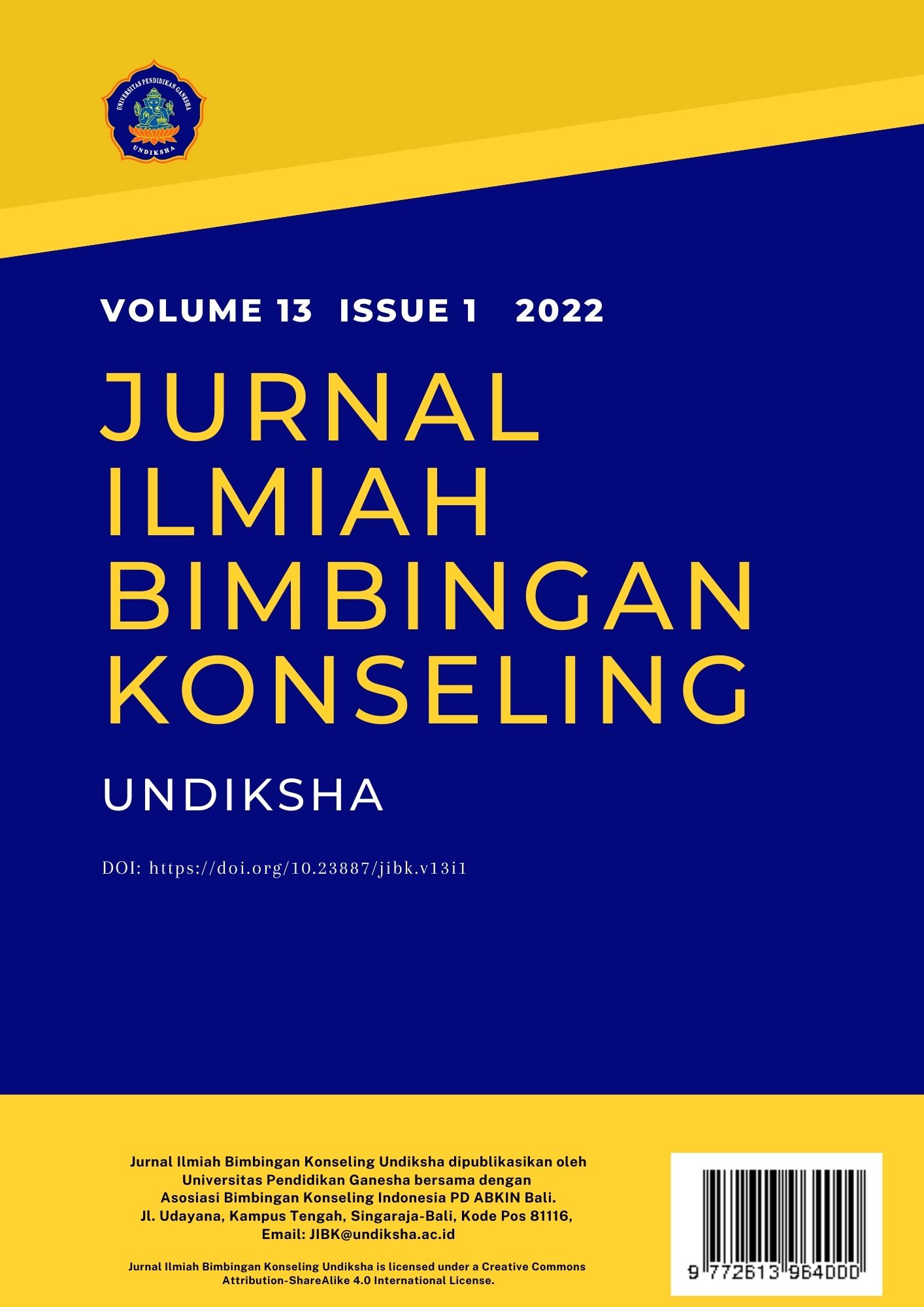Keefektifan Konseling Kelompok Dengan Teknik Penguatan Positif Dalam Menurunkan Prokrastinasi Siswa
DOI:
https://doi.org/10.23887/jibk.v13i1.45392Keywords:
Prokrastinasi, Penguatan Positif, Konseling KelompokAbstract
Penelitian ini bertujuan untuk menguji konseling kelompok dengan teknik penguatan positif pada prokrastinasi belajar siswa kelas XI SMA Dr. Soetomo Surabaya. Prokrastinasi merupakan suatu kejadian yang dilakukan siswa dalam menunda pekerjaan. Konseling kelompok merupakan cara yang dilakukan konselor untuk bertukar pikiran dengan konseli. Sedangkan penguatan positif merupakan bentuk perilaku yang diharapkan oleh siswa. Penelitian ini menggunakan sampel sebanyak 6 siswa yang diberikan perlakuan selama 7 kali pertemuan dengan perubahan signifikan pada siswa. Dari hasil pretest dan posttest digunakan uji Wilcoxon untuk menunjukkan bahwa terjadi penurunan prokrastinasi belajar siswa dimana perolehan rata-rata pada pretest adalah 121,38 dan posttest adalah 88, karena signifikansi = P < 0,05. Dengan demikian dapat disimpulkan bahwa konseling kelompok dengan teknik penguatan positif berpengaruh terhadap prokrastinasi belajar siswa kelas XI SMA Dr. Soetomo Surabaya
References
Burka, J. K & Yuen, L.M. (2008). Procrastination: Why You Do It, What To Do About It. Cambridge: Da Capo Press.
Corey, G. (2005). Teori Dan Praktik Konseling Dan Psikoterapi. Bandung: PT Refika Aditama.
Ellis, A. & Knaus, W. (2004). Overcoming Procrastination, New American Library, New York Amerika.
Ermida & Florentina Y. A. Pelatihan SAT (Self Regulation, Assertiveness, Time Management dan Prokrastinasi Akademik Pada Siswa SMA, Fakultas Psikologi Universitas Katolik Widya Mandala Surabaya). Jurnal Psikologi)
Ferrari, J. (1995). Self Handicapping by Procrastinator: Protecting self-Estem social Estem, or Both?, Journal Research in Personality, Vol.25.No2, Hal245-261, http://www.sciencedirect.com DOI: https://doi.org/10.1016/0092-6566(91)90018-L
Herliandry, L. D., Nurhasanah, N., Suban, M. E., & Kuswanto, H. (2020). Pembelajaran Pada Masa Pandemi Covid-19. JTP - Jurnal Teknologi Pendidikan, 22(1), 65–70. https://doi.org/10.21009/jtp.v22i1.15286 DOI: https://doi.org/10.21009/jtp.v22i1.15286
Ni'am, Nidhomun. (2018). Pengaruh Layanan Konseling Kelompok Dengan Teknik Self Management Untuk Mengurangi Perilaku Prokrastinasi Akademik Peserta Didik Kelas IX SMP Negeri 3 Bandar Lampung Tahun Pelajaran 2018.
Nisa, K. R. (2019). Pengaruh Konseling Kelompok Dengan Teknik Self Management Untuk Menurunkan Perilaku Prokrastinasi Akademik Peserta Didik Kelas VIII SMP Taman Siswa Teluk Betung Bandar Lampung.
Nur, K. L. (2020). Pengaruh Laynan Konseling Kelompok Menggunakan Teknik Assertif Training Untuk Mengurangi Prokrastinasi Akademik Peserta Didik SMP Negeri 19 Bandar Lampung.
Purwanta, E. (2012). Modifikasi Perilaku. Yogyakarta: Pustaka Belajar.
Saputra, Y. W. A. (2020). Pengaruh Bimbingan Kelompok Dengan Teknik Reinforcement Positive Dan Self Management Untuk Meningkatkan Konsetrasi Belajar DOI: https://doi.org/10.31603/edukasi.v12i1.3198
Sugiyono, 2015. Metode Penelitian Kuantitatif, Kualitatig, Dan R&D. Bandung: Alfabeta.
Suliga, Aprilia. (2018). Pengaruh Konseling Kelompok Teknik Cognitive Restructuring Untuk Mengurangi Perilaku Prokrastinasi Akademik Peserta Didik SMA Al-Azhar 03 Bandar Lampung.
Suryabrata, 2015. Metode Penelitian. Jakarta: PT Raja Grafindo Persada.
Tamami, A. N. I. (2011). Pengaruh Pola Asuh Dan Self Regulated Learning Terhadap Prokrastinasi Pada Siswa MTS N 3 Pondok Pinang. 5 Desember 2011. Fakultas Psikologi Universits Islam Negeri (UIN) Syarif Hidayatullah.
Tohirin. 2007. Bimbingan Dan Konseling Di Sekolah dan Madrasah Berbasis Integritas. Jakarta: PT Raja Grafindo Persada.
Wyk, L. (2004). The Relationsip Between Procrastination and Stress In the Life Of The High School teacher. Universitas of Pretoria.
Downloads
Published
Issue
Section
License
Copyright (c) 2022 Nelasari

This work is licensed under a Creative Commons Attribution 4.0 International License.
Jurnal Ilmiah Bimbingan Konseling Undiksha is an Open Access Journal. The authors who publish the manuscript in this journal agree to the following terms:
JIBK is licensed under a Creative Commons Attribution 4.0 International License. This permits anyone to copy, redistribute, remix, transmit and adapt the work provided the original work and source is appropriately cited.
This means:
Jurnal Ilmiah Bimbingan Konseling is licensed under a Creative Commons Attribution 4.0 International License.
(1) Under the CC-BY license, authors retain ownership of the copyright for their article, but authors grant others permission to use the content of publications in JIBK in whole or in part provided that the original work is properly cited. Users (redistributors) of JIBK are required to cite the original source, including the author's names, JIBK as the initial source of publication, year of publication, volume number, issue, and Digital Object Identifier (DOI); (2) The authors are the copyright owner of the article, and the author grants the JIBK held the first publication right.









.png)

.jpg)
